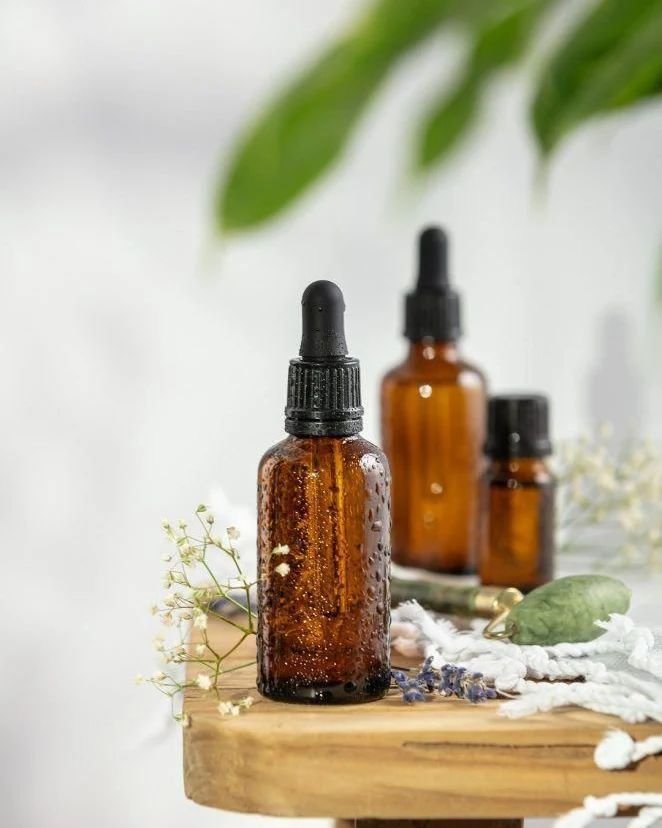
Face oils can be a fantastic addition to any skincare routine, offering hydration, nourishment, and an added layer of protection. Here’s a comprehensive guide on recommendations, usage, and preservation:
Recommendations
Dry Skin:
- Argan Oil: Rich in vitamin E, Fatty acids: omega-6 (linoleic acid) and omega-9 (oleic acid), Squalene, Polyphenols, Sterols. It’s lightweight yet deeply moisturizing, reducing the appearance of fine lines and wrinkles, regulating sebum production and reduce breakouts.
- Marula Oil: Its non-greasy texture, rich in Fatty acids: omega-6 (linoleic acid) and omega-9 (oleic acid), Vitamin C, Vitamin E, Amino acids, Flavonoids. That helps deeply moisturize, lock in hydration, balances oil production and soothes skin, protect against free radicals and environmental damage, promote skin repair and elasticity and offer anti-inflammatory and antimicrobial properties.
- Avocado Oil: Rich in Fatty acids: omega-6 (linoleic acid) and omega-9 (oleic acid), palmitic Acid, Vitamin E/ A/D, Lecithin, Phytosterols, Carotenoids. That helps deeply moisturize, lock in hydration, maintain the skin barrier and calm inflammation, protect against free radicals and environmental damage, encourages cell turnover and renewal, aiding in anti-aging.
Oily/Acne-Prone Skin:
- Jojoba Oil: Rich in Fatty acids: palmitic acid, stearic acid, erucic acid, Vitamin E, Vitamin B-complex, Zinc and Copper and Antioxidants. That helps deeply moisturize, lock in hydration, maintain the skin barrier and calm inflammation, protect against free radicals and environmental damage, aid in wound healing and skin health.
- Grapeseed Oil: Lightweight with antimicrobial properties. Rich in Fatty acids: Linoleic Acid (Omega-6), Oleic Acid (Omega-9), Vitamin E, Proanthocyanidins, Phenolic Compounds, Phytosterols. That helps quickly absorbs into the skin without leaving a greasy residue, reduce the appearance of fine lines, wrinkles, and age spots, brighten skin and promote an even complexion.
- Tea Tree Oil (diluted): Rich in Terpenes (e.g., Terpinen-4-ol), Cineole, Limonene and Alpha-pinene. Excellent for spot treatment of acne. That helps in antibacterial, antifungal, and anti-inflammatory.
Combination Skin:
- Rosehip Oil: Rich in Fatty Acids: Linoleic Acid (Omega-6), Alpha-Linolenic Acid (Omega-3), Oleic Acid (Omega-9), Vitamin C, Vitamin E, Provitamin A (Retinoids), Polyphenols and Flavonoids. That helps deeply moisturize, maintain the skin barrier and calm inflammation, protect against free radicals and environmental damage, brighten the skin and improves collagen synthesis, boosts cell turnover, reduces the appearance of scars, fine lines, and wrinkles.
- Squalane: It is composed of saturated hydrocarbons, which help mimic the skin’s natural oils, promoting moisture retention and barrier protection
Usage
When to Use:
- Face oils are typically applied after water-based serums and before or after moisturizer, depending on the skin’s needs.
How to Apply:
- Take 2-3 drops of oil.
- Warm it between your palms.
- Gently press onto the face, avoiding rubbing, to lock in moisture and nutrients.
Frequency:
- Use daily or as needed, typically in your evening routine.
Tips:
- For an extra glow, mix a drop of face oil with your foundation.
- Add a few drops to your moisturizer for an extra hydration boost.
- Pair with a facial massage or gua sha for improved circulation and lymphatic drainage.
Preservation
Storage:
- Keep oils in a cool, dark place to prevent oxidation.
- Opt for dark glass bottles to protect from UV light.
- Avoid storing in the bathroom due to humidity and heat.
Shelf Life:
- Check for expiration dates. Most oils last 6 months to 2 years depending on their stability.
- Oils high in polyunsaturated fats (e.g., rosehip) spoil faster. Store them in the refrigerator.
Signs of Spoilage:
- Change in smell (rancid odor).
- Change in color or consistency.
- Separation or cloudiness in previously clear oils.
Cautions:
- Always perform a patch test before introducing a new oil to your routine.
- Avoid mineral oils or oils with synthetic fragrances as they may irritate sensitive skin.
- Use non-comedogenic oils to prevent clogged pores, especially if acne-prone.
With these tips, you can integrate face oils effectively into your skincare routine, making the most of their hydrating and nourishing benefits!
